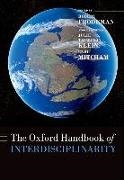Read more
Taking stock of interdisciplinarity as it nears its century mark, the Oxford Handbook of Interdisciplinarity constitutes a major new reference work on the topic of interdisciplinarity, a concept of growing academic and societal importance.
List of contents
Robert Frodeman: Introduction; PART I: THE TERRAIN OF KNOWLEDGE; 1 Peter Weingart: A Short History of Knowledge Formations; 2 Julie Thompson Klein: A Taxonomy of Interdisciplinarity; 3 Wolfgang Krohn: Interdisciplinary Cases and Disciplinary Knowledge; 4 Steve Fuller: Deviant Interdisciplinarity; 5 Dan Sarewitz: Against Holism; PART 2: INTERDISCIPLINARITY IN THE DISCIPLINES; 6 Robert P. Crease: Physical Sciences; 7 Craig Calhoun & Diana Rhoten: Integrating the Social Sciences: Theoretical Knowledge, Methodological Tools, and Practical Applications; 8 Warren Burggren, Kent Chapman, Bradley Keller, Michael Monticino & John Torday: Biological Sciences; 9 Julie Thompson Klein & Richard Parncutt: Art and Music Research; 10 Patricia J. Culligan & Feniosky Pena-Mora: Engineering; 11 Sarah E. Fredericks: Religious Studies; 12 Carole L. Palmer: Information Research on Interdisciplinarity; PART 3: KNOWLEDGE INTERDISCIPLINED; 13 Sheila Jasanoff: A Field of its Own: the Emergence of Science and Technology Studies; 14 Cathy N. Davidson: Humanities and Technology in the Information Age; 15 Adam Briggle & Clifford G. Christians: Media and Communication; 16 Paul Thagard: Cognitive Science; 17 Johannes Lenhard: Computation and Simulation; 18 Anne Balsamo & Carl Mitcham: Ethics; 19 Prasad Boradkar: Design as Problem Solving; 20 Veronica Boix Mansilla: Learning to Synthesize: The Development of Interdisciplinary Understanding; PART 4: INSTITUTIONALIZING INTERDISCIPLINARITY; 21 Katri Huutoniemi: Evaluating Interdisciplinary Research; 22 J. Britt Holbrook: Peer Review; 23 Clark A. Miller: Policy Challenges and University Reform; 24 Beth A. Casey: Administering Interdisciplinary Programs; 25 William H. Newell: Undergraduate General Education; 26 Deborah DeZure: Interdisciplinary Pedagogies in Higher Education; 27 Stephanie Pfirman & Paula J.S. Martin: Facilitating Interdisciplinary Scholars; 28 Jessica K. Graybill & Vivek Shandas: Doctoral Student and Early Career Academic Perspectives; 29 Daniel Callahan: A Memoir of an Interdisciplinary Career; PART 5: KNOWLEDGE TRANSDISCIPLINED; 30 Gertrude Hirsch Hadorn, Christian Pohl, & Gabriele Bammer: Solving Problems through Transdisciplinary Research; 31 Styse Strijbos: Systems Thinking; 32 Daniel Stokols, Kara L. Hall, Richard P. Moser, Annie Feng, Shalini Misra, and Brandie K. Taylor: Cross-disciplinary Team Science Initiatives: Research, Training, and Translation; 33 J. Baird Callicott: The Environment; 34 Jennifer L. Terpstra, Allan Best, David B. Abrams, & Gregg Moor: Health Science and Health Services; 35 Marilyn Averill: Law; 36 Sven Ove Hansson: Risk; 37 Bruce A. Vojak, Raymond L. Price, & Abbie Griffin: Corporate Innovation; Index
About the author
Robert Frodeman is Professor of Philosophy in the Department of Philosophy and Religion Studies at the University of North Texas. He specializes in environmental philosophy, science policy, and questions concerning interdisciplinarity. Holder of advanced degrees in philosophy (a PhD, from Penn State) and geology (a masters from the University of Colorado), he has held positions at the University of Texas, the University of Tennessee, and the University of Colorado. He served as a consultant for the US Geological Survey for eight years, was the 2001-2002 Hennebach Professor of the Humanities at the Colorado School of Mines, and was an ESRC Fellow at Lancaster University in England in the spring of 2005. He is the author of 'Geo-Logic: Breaking Ground between Philosophy and the Earth Sciences' (2003), and co-editor of the 'Encyclopaedia of Environmental Ethics and Philosophy' (2008). He is founding Director of UNT's Center for the Study of Interdisciplinarity.; Julie Thompson Klein is Pro

